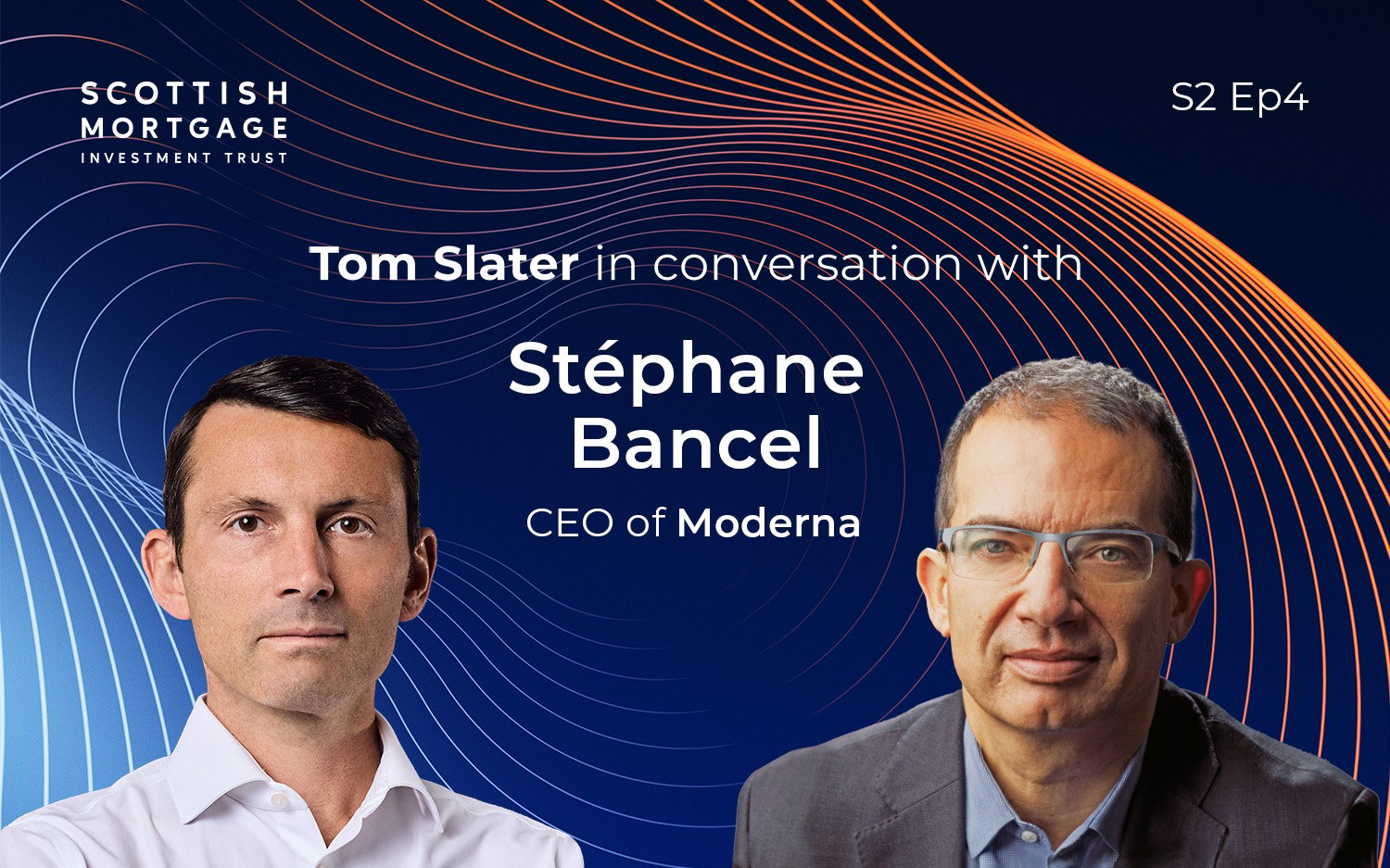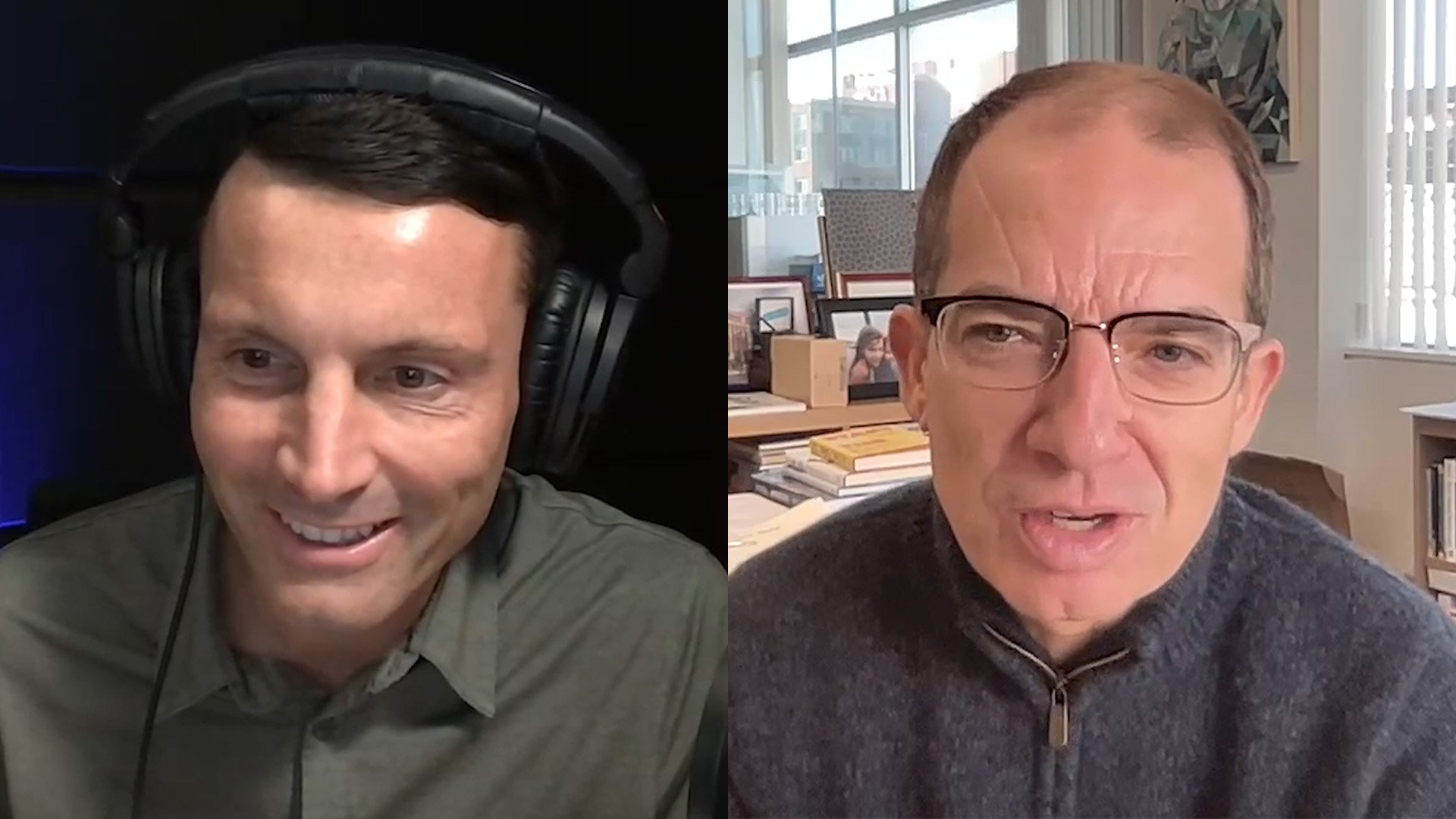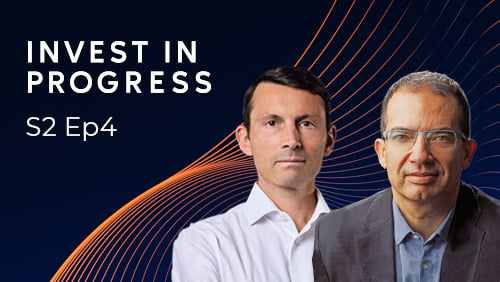Moderna: designing drugs on a computer
Claire Shaw – Portfolio Director
Key Points
- Traditional drug development has failed to address many health issues, including respiratory illnesses and cancers
- Messenger RNA (mRNA) can produce more effective and targeted drugs, much faster than traditional methods
- Scottish Mortgage invests in Moderna because of its huge potential to solve some of the most complex health problems worldwide, not just its Covid-19 vaccine success

As with any investment, your capital is at risk.
Moderna gained global fame for its Covid-19 vaccine, which the biotech company hopes will be the first of many transformative applications of its messenger RNA (mRNA) technology.
In Scottish Mortgage’s Invest in Progress podcast, Manager Tom Slater asks Moderna’s chief executive Stéphane Bancel what’s next for its cell-coding science, and how it could solve some of humanity’s most challenging health issues, from respiratory illnesses to cancer.
Writing the code of life
It’s easy to forget that triumphantly helping to contain a global pandemic was unforeseeable when Bancel joined Moderna in 2011. He admits he was initially sceptical about mRNA technology – using code to create molecules that instruct our cells to produce the antibodies needed to fight off viruses and unwanted bacteria.
He changed his mind when he saw the data and recognised how repeatable the process could be. He believed if the company could find a way to make mRNA technology work, “it would have a profound impact on humanity, on society, by developing many medicines that just aren’t doable using old analogue technologies.”
“So, that’s what we set out to do,” he explains, “to build a company that would be a platform that would have many verticals [drug categories].”
Bancel explains, “With mRNA, it’s four letters, like zeros and ones with software. You code everything.” These provide a blueprint for arranging A, T, C and G – the building blocks of DNA. The only difference with most vaccines is the order of those letters. Because this platform has digital characteristics, the more it is used, the more data it collects, and thus, the more accurate and powerful its future results become.
Compare this to traditional pharma, where production starts from scratch each time, the success of one drug telling you nothing about the success of the next, and you can see why Moderna may be onto something big.

Listen to the latest episode of the Invest in Progress podcast to hear first-hand the behind-the-scenes story of Moderna’s Covid-19 vaccine, including how Moderna’s app coded it in just 10 minutes.
Listen to the podcast here.
He likens the different verticals of Moderna’s platform to the varying services of Amazon. “Vaccines are just our first vertical getting to market, and Covid-19 is just the first vaccine of that vertical.”
From Covid to cancer
But Covid-19 was never in the business plan. Bancel recalls that initially he thought it would be an outbreak like SARS or MERS. It was in January 2020 that he realised “this is going to be like the 1918 flu pandemic. It’s going to be everywhere and it’s going to kill a lot of people.”
Once the Chinese government released the code of the virus, the team at Moderna immediately inputted the protein instruction to their software, dissected the technical specifications and had a proposed code for a vaccine in just 10 minutes.
The next challenge was conducting testing and approval to get the vaccine to market as quickly as possible. But what is seldom highlighted is “[the] massive, almost miraculous scaling up of manufacturing”. To put this in context, Moderna delivered 100,000 doses in clinical trials in 2019, and in 2020 delivered 10,000 times that – 100 million doses of the approved Covid-19 vaccine.
It’s a challenge that will keep evolving as Moderna continues to develop a wide range of treatments for various clinical needs.
One way to address this in the vaccination space is combining vaccines for Covid-19 with the most common respiratory diseases causing flu-like symptoms. A single effective vaccine given once a year could reduce hospitalisations, reduce strain on healthcare systems, and promote consistency of vaccine take-up, securing revenues for Moderna.
The advent of Moderna’s personalised cancer vaccines will also change the manufacturing dynamic from Covid’s one-vaccine-a-billion-doses to one-vaccine-one-dose.
Bancel explains that, in simple terms, Moderna’s technology reads the DNA of a patient’s healthy cells compared with their cancerous cells to identify where the mutations are occurring. The scientists then write a code that instructs the immune system to ’reboot’ to enable it to detect the mutations that it wasn’t seeing before.

To achieve this level of individualisation, the company is focused on innovation, developing robotics and digital tools to shrink the time it takes to tailor these products for one human at a time.
Bancel thinks if current safety trials go as the company hopes, “A 2025 launch for melanoma [a type of skin cancer] is doable.”
Another area of significant progress is in latent viruses. These are viruses that once contracted, never leave your system – human immunodeficiency virus (HIV) and herpes viruses such as Epstein-Barr virus (EBV) and congenital cytomegalovirus (CMV), for example. These viruses are extremely complex and cause all kinds of health issues. But many of them don’t yet have a clinical solution because of their complexity.
Bancel explains that Moderna has been working on solutions – with some, including a first-in-class vaccine against CMV, currently in phase 3 trials (the final stage before a treatment receives US regulatory approval). If successful, they could deliver significant benefits for public health.
Decoding the future
Moderna is a large holding for Scottish Mortgage, and the team is often asked about the investment case due to the challenging period the company has experienced following the pandemic.
Slater believes the reason for this is, quite simply, the market’s primary focus on Covid. The vaccine was the immediate cash generator and the demand for it post-pandemic has been lower than expected. The company has a rich pipeline of products that have not yet been approved and the market has attached a higher risk weighting to that than we have.
In short, Scottish Mortgage believes Moderna's established success increases the likelihood of further breakthroughs. With its focus on innovation and potential to address unmet clinical needs, Moderna offers hope for a brighter and healthier future for millions.
Slater concludes, “There are huge areas of unmet clinical need that cause untold human suffering, that [Moderna’s] technology will be able to address. And it will create a huge amount of value for society in doing that. And even if it takes a small fraction of that value… that will translate into an enormous business opportunity.”
About the author - Claire Shaw
Portfolio Director
Claire Shaw is a portfolio director and plays a prominent role in servicing Scottish Mortgage’s UK shareholder base. Before joining in 2019, she spent over a decade as a fund manager with a focus on managing European equity portfolios for a global client base. With a background in analysing companies and communicating investment ideas, Claire is also responsible for creating engaging content that makes the Scottish Mortgage portfolio accessible to all its shareholders. Beyond that, she works closely with the managers, meeting with portfolio companies and conducting in-depth portfolio discussions with shareholders.
Regulatory Information
This content was produced and approved at the time stated and may not have been updated subsequently. It represents views held at the time of production and may not reflect current thinking. Read our Legal and regulatory information for further details.
A Key Information Document is available by visiting our Documents page. Any images used in this content are for illustrative purposes only.
This content does not constitute, and is not subject to the protections afforded to, independent research. Baillie Gifford and its staff may have dealt in the investments concerned. The views expressed are not statements of fact and should not be considered as advice or a recommendation to buy, sell or hold a particular investment.
Baillie Gifford & Co and Baillie Gifford & Co Limited are authorised and regulated by the Financial Conduct Authority (FCA). The investment trusts managed by Baillie Gifford & Co Limited are listed on the London Stock Exchange and are not authorised or regulated by the FCA.
Baillie Gifford Asia (Hong Kong) Limited 柏基亞洲(香港)有限公司 (BGA) holds a Type 1 licence from the Securities and Futures Commission of Hong Kong to market and distribute Baillie Gifford’s range of collective investment schemes and closed-ended funds such as investment trusts to professional investors in Hong Kong.
Baillie Gifford Asia (Singapore) Private Limited (BGAS) is regulated by the Monetary Authority of Singapore as a holder of a capital markets services licence to conduct fund management activities for institutional investors and accredited investors in Singapore. BGA and BGAS are wholly owned subsidiaries of Baillie Gifford Overseas Limited, which is wholly owned by Baillie Gifford & Co.
Europe
Scottish Mortgage Investment Trust PLC (the “Company”) is an alternative investment fund for the purpose of Directive 2011/61/EU (the “AIFM Directive”). Baillie Gifford & Co Limited is the alternative investment fund manager (“AIFM”) of the Company and has been authorised for marketing to Professional Investors in this jurisdiction.
This content is made available by Baillie Gifford Investment Management (Europe) Limited (“BGE”), which has been engaged by the AIFM to carry out promotional activities relating to the Company. BGE is authorised by the Central Bank of Ireland as an AIFM under the AIFM Regulations and as a UCITS management company under the UCITS Regulation. BGE also has regulatory permissions to perform promotional, advisory and Individual Portfolio Management activities. BGE has passported its authorisations under the mechanisms set out in the AIFM Directive.
Belgium
The Company has not been and will not be registered with the Belgian Financial Services and Markets Authority (Autoriteit voor Financiële Diensten en Markten / Autorité des services et marchés financiers) (the FSMA) as a public foreign alternative collective investment scheme under Article 259 of the Belgian Law of 19 April 2014 on alternative collective investment institutions and their managers (the Law of 19 April 2014). The shares in the Company will be marketed in Belgium to professional investors within the meaning the Law of 19 April 2014 only. Any offering material relating to the offering has not been, and will not be, approved by the FSMA pursuant to the Belgian laws and regulations applicable to the public offering of securities. Accordingly, this offering as well as any documents and materials relating to the offering may not be advertised, offered or distributed in any other way, directly or indirectly, to any other person located and/or resident in Belgium other than to professional investors within the meaning the Law of 19 April 2014 and in circumstances which do not constitute an offer to the public pursuant to the Law of 19 April 2014. The shares offered by the Company shall not, whether directly or indirectly, be marketed, offered, sold, transferred or delivered in Belgium to any individual or legal entity other than to professional investors within the meaning the Law of 19 April 2014 or than to investors having a minimum investment of at least EUR 250,000 per investor.
Germany
The Trust has not offered or placed and will not offer or place or sell, directly or indirectly, units/shares to retail investors or semi-professional investors in Germany, i.e. investors which do not qualify as professional investors as defined in sec. 1 (19) no. 32 German Investment Code (Kapitalanlagegesetzbuch – KAGB) and has not distributed and will not distribute or cause to be distributed to such retail or semi-professional investor in Germany, this document or any other offering material relating to the units/shares of the Trust and that such offers, placements, sales and distributions have been and will be made in Germany only to professional investors within the meaning of sec. 1 (19) no. 32 German Investment Code (Kapitalanlagegesetzbuch – KAGB).
Luxembourg
Units/shares/interests of the Trust may only be offered or sold in the Grand Duchy of Luxembourg (Luxembourg) to professional investors within the meaning of Luxembourg act by the act of 12 July 2013 on alternative investment fund managers (the AIFM Act). This document does not constitute an offer, an invitation or a solicitation for any investment or subscription for the units/shares/interests of the Trust by retail investors in Luxembourg. Any person who is in possession of this document is hereby notified that no action has or will be taken that would allow a direct or indirect offering or placement of the units/shares/interests of the Trust to retail investors in Luxembourg.
Switzerland
The Trust has not been approved by the Swiss Financial Market Supervisory Authority (“FINMA”) for offering to non-qualified investors pursuant to Art. 120 para. 1 of the Swiss Federal Act on Collective Investment Schemes of 23 June 2006, as amended (“CISA”). Accordingly, the interests in the Trust may only be offered or advertised, and this document may only be made available, in Switzerland to qualified investors within the meaning of CISA. Investors in the Trust do not benefit from the specific investor protection provided by CISA and the supervision by the FINMA in connection with the approval for offering.
Singapore
This content has not been registered as a prospectus with the Monetary Authority of Singapore. Accordingly, this content and any other content or material in connection with the offer or sale, or invitation for subscription or purchase, of the Trust may not be circulated or distributed, nor may be offered or sold, or be made the subject of an invitation for subscription or purchase, whether directly or indirectly, to persons in Singapore other than (i) to an institutional investor (as defined in Section 4A of the Securities and Futures Act 2001, as modified or amended from time to time (SFA)) pursuant to Section 274 of the SFA, (ii) to a relevant person (as defined in Section 275(2) of the SFA) pursuant to Section 275(1), or any person pursuant to Section 275(1A), and in accordance with the conditions specified in Section 275 of the SFA, or (iii) otherwise pursuant to, and in accordance with the conditions of, any other applicable provision of the SFA.
Where the Trust is subscribed or purchased under Section 275 by a relevant person which is:
(a) a corporation (which is not an accredited investor (as defined in Section 4A of the SFA)) the sole business of which is to hold investments and the entire share capital of which is owned by one or more individuals, each of whom is an accredited investor; or
(b) a trust (where the trustee is not an accredited investor) whose sole purpose is to hold investments and each beneficiary of the trust is an individual who is an accredited investor, securities or securities-based derivatives contracts (each term as defined in Section 2(1) of the SFA) of that corporation or the beneficiaries’ rights and interest (howsoever described) in that trust shall not be transferred within six months after that corporation or that trust has acquired the securities pursuant to an offer made under Section 275 except:
(1) to an institutional investor or to a relevant person or to any person arising from an offer referred to in Section 275(1A) or Section 276(4)(c)(ii) of the SFA,
(2) where no consideration is or will be given for the transfer;
(3) where the transfer is by operation of law; or
(4) pursuant to Section 276(7) of the SFA or Regulation 37A of the Securities and Futures (Offers of Investments) (Securities and Securities-based Derivatives Contracts) Regulations 2018.






